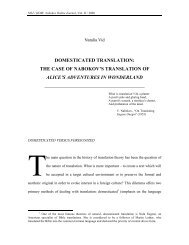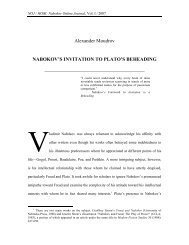Vladimir Nabokov, lecteur de l'autre: Incitations, by Isabelle Poulin ...
Vladimir Nabokov, lecteur de l'autre: Incitations, by Isabelle Poulin ...
Vladimir Nabokov, lecteur de l'autre: Incitations, by Isabelle Poulin ...
Create successful ePaper yourself
Turn your PDF publications into a flip-book with our unique Google optimized e-Paper software.
NOJ / НОЖ: <strong>Nabokov</strong> Online Journal, Vol. II / 2008<br />
<strong>Vladimir</strong> <strong>Nabokov</strong>, <strong>lecteur</strong> <strong>de</strong> <strong>l'autre</strong>: <strong>Incitations</strong>, <strong>by</strong> <strong>Isabelle</strong> <strong>Poulin</strong>. Pessac: Presses<br />
Universitaires <strong>de</strong> Bor<strong>de</strong>aux, 2005, 248pp. Bibliography.<br />
These ‘incitations’ 1 explore what it is to be a 'good rea<strong>de</strong>r' in relation to the work of<br />
<strong>Vladimir</strong> <strong>Nabokov</strong>. <strong>Poulin</strong> concentrates on the exchange of influence between French<br />
authors and <strong>Nabokov</strong> in examining the role of the rea<strong>de</strong>r in fulfilling the author's need to<br />
communicate. From creative conception to the readings capable of ‘killing’ a text, this is<br />
a wi<strong>de</strong> ranging discussion around the closely linked themes of reading and writing, self<br />
and other.<br />
<strong>Poulin</strong> begins <strong>by</strong> discussing the significance of ‘the artistic moment’ – the way in<br />
which for <strong>Nabokov</strong> the experience of intense moments of visual intimacy with the thing,<br />
and with the world (a moment which she likens to Proust's Bergson on noticing the small<br />
stretch of yellow wall in Vermeer's View of Delft) had the power to produce a revelatory<br />
moment of insight and inspiration, which, he felt, allowed him, if communicated, to<br />
escape the 'prisons' of time and of the ego. However, the successful expression of these<br />
moments is reliant on the appreciation of ‘good rea<strong>de</strong>rs,’ and <strong>Poulin</strong> stresses <strong>Nabokov</strong>'s<br />
<strong>de</strong>sire to ‘éduquer le regard’ (35) of his rea<strong>de</strong>rs, so that through active readings,<br />
1 The term is borrowed from Marcel Proust's Sur la lecture: ‘C'est là, en effet, un <strong>de</strong>s grands et<br />
merveilleux charactères <strong>de</strong>s beaux livres... que pour l'auteur ils pourraient s'appeler 'Conclusions' et pour le<br />
<strong>lecteur</strong> ‘<strong>Incitations</strong>'’ (There it is, in effect, one of the great and marvellous characteristics of beautiful<br />
books… that for the author they could be called ‘Conclusions’, and for the rea<strong>de</strong>r, ‘Incitements’).
<strong>Nabokov</strong>: <strong>Incitations</strong><br />
'groun<strong>de</strong>d in the relationship between <strong>de</strong>tails' (34), his essential aim of a rea<strong>de</strong>r and writer<br />
'united' in these moments might be achieved. The rest of the book is largely <strong>de</strong>dicated to<br />
investigating the complexities of achieving this – especially for a bilingual, émigré writer<br />
such as himself.<br />
<strong>Nabokov</strong> stated, ‘To write on Pushkin and on me... you need to know French<br />
literature.’ The first of two main sections 'en lisant, en écrivant d'après <strong>Nabokov</strong>' brings<br />
together a series of essays on the influence of French artists and writers on the<br />
<strong>de</strong>velopment of <strong>Nabokov</strong>'s attitu<strong>de</strong>s to reading and writing. <strong>Poulin</strong>, 'reading over<br />
<strong>Nabokov</strong>'s shoul<strong>de</strong>r' (11), shows some of the ways in which <strong>Nabokov</strong> incorporated his<br />
readings of French writers into his own work – both in the choice and <strong>de</strong>velopment of his<br />
prose style, and in his extensive use of literary references. The first chapter concentrates<br />
on the influence of Rimbaud's synaesthetic poetry on what <strong>Poulin</strong> terms <strong>Nabokov</strong>'s 'prose<br />
poetique', referring in particular to the use of the imagery of jewellery in works such as<br />
Bend Sinister and Ada as an 'open sesame to the world of the imagination' (63).<br />
Chateaubriand, 'omnipresent' in <strong>Nabokov</strong>'s American work, is the next writer he admired<br />
to be discussed. <strong>Poulin</strong> highlights Chateaubriand's influence on <strong>Nabokov</strong>'s approach to<br />
landscape, emphasising in particular <strong>Nabokov</strong>'s preferred <strong>de</strong>finition of Romantic, 'as<br />
applied to a style abounding in vivid, specific <strong>de</strong>tails', and explores possible links<br />
between political and poetic experience. In the fourth chapter, <strong>Poulin</strong> explains the<br />
regular appearance of a 'Flaubertian hypotexte' in <strong>Nabokov</strong>'s work as an homage to a<br />
writer whom he revered for his masterful use of ironic distance and narrative<br />
fragmentation.<br />
The question of 'authenticity' in literature is raised: Sartre (cited, perhaps a little<br />
controversially, as a counter-influence, or anti-mo<strong>de</strong>l for <strong>Nabokov</strong>), reproached in<br />
particular what he saw as the 'exhibitionism' of <strong>Nabokov</strong> writing, 'seeing himself write'<br />
(83). However, <strong>Poulin</strong> explores the possibility that, forced as an emigre to reconstruct his<br />
i<strong>de</strong>ntity in the 'mirror' of a foreign culture, his intertextual approach might in fact have<br />
been essential in allowing him to be able to 'see himself' at all. She also investigates how<br />
<strong>Nabokov</strong> works with the duplicitous nature of language in such a way as to express (to<br />
those rea<strong>de</strong>rs willing to investigate 'the spaces hollowed between what an artist has
NOJ / НОЖ: <strong>Nabokov</strong> Online Journal, Vol. II / 2008<br />
written and what he wanted to say' (112)) 'the purest truth of fiction' (129), the 'truth<br />
beyond language' (147) – which is the awareness of 'the moment of <strong>de</strong>tail'. The final<br />
essay in the first section focuses on <strong>Nabokov</strong>'s controversial approach – his use of arcane<br />
terminology and exten<strong>de</strong>d footnotes – to the translation of Eugene Onegin in his attempt<br />
to convey the precision of the imagery and the 'allusive power' of Pushkin for English-<br />
speaking rea<strong>de</strong>rs, discussing how far it is possible to go in 'the language of another<br />
person'.<br />
Questions of the limitations of written language as a form of communication, the<br />
paradoxes of i<strong>de</strong>ntity and the nature of 'authenticity' in literature are carried through into<br />
the second main section, ‘en lisant, en écrivant après <strong>Nabokov</strong>’. Here, <strong>Poulin</strong><br />
investigates why 'pratiques <strong>de</strong> secon<strong>de</strong> main' (151) – pastiche, parody, translation and<br />
rewriting – are so highly valued, and pursued to such lengths, in the post-mo<strong>de</strong>rn era.<br />
She presents Lahogue's La Ressemblance – a rewriting of <strong>Nabokov</strong>'s French translation<br />
of Despair, a work which pastiches the style and parodies the subject of Dostoevsky's<br />
The Double, which itself contains parody and the rewriting of a 'worn-out subject' (152) –<br />
in or<strong>de</strong>r to discuss further how these techniques function in allowing a writer to find<br />
liberation from the strictures of the self. The second chapter likewise uses Dostoevsky,<br />
<strong>Nabokov</strong> and a mo<strong>de</strong>rn French author, <strong>de</strong>s Forets, in an essay on the portrayal of the<br />
writer as an isolated, solitary figure for whom writing constitutes both 'une voix et une<br />
écoute' (167), and she looks at the significance of the resulting hierarchy of conflicting<br />
perceptions that the rea<strong>de</strong>r is frequently presented with: 'le désir désespéré <strong>de</strong> distinction<br />
mis en scene par le personnage gagne le narrateur qui dénonce l'auteur qui met au défi le<br />
<strong>lecteur</strong>' (176). 2<br />
In the final chapter of the second main section, <strong>Poulin</strong> raises the issue of conflict<br />
between rea<strong>de</strong>r and writer. Writing on Natalie Sarraute and <strong>Nabokov</strong>, she refers to the<br />
relationship between author and rea<strong>de</strong>r in terms of a 'contract' which the rea<strong>de</strong>r has an<br />
obligation to honour in or<strong>de</strong>r for the work to 'live' – and she argues that much critical<br />
analysis fails to do this. She refers to Sarraute's Les Fruits d'Or and <strong>Nabokov</strong>'s Pale Fire<br />
2 The <strong>de</strong>sperate <strong>de</strong>sire for distinction, enacted <strong>by</strong> the character, influences the narrator, who<br />
<strong>de</strong>nounces the author, who lays down a challenge to the rea<strong>de</strong>r.
<strong>Nabokov</strong>: <strong>Incitations</strong><br />
in or<strong>de</strong>r to <strong>de</strong>monstrate the authors' awareness of the ways – through unnecessarily<br />
confrontational, overly-<strong>de</strong>tailed or overly-interpretive analysis – that, in Sarraute's words,<br />
'the commentary kills the text' (187). <strong>Poulin</strong> asserts that, for <strong>Nabokov</strong> and Sarraute, the<br />
'i<strong>de</strong>al rea<strong>de</strong>r' must maintain the correct 'focal distance', 'must remain relatively close to<br />
the text, but not too close' (197) in or<strong>de</strong>r to really see what it is they intend to<br />
communicate.<br />
This book could be seen as <strong>Poulin</strong>'s attempt at honouring this contract, at<br />
maintaining the correct 'focal distance', at being a 'good rea<strong>de</strong>r'. These 'incitations' are a<br />
success on her own terms: they form a well-argued aca<strong>de</strong>mic study born out of the<br />
inherently subjective personal experience of her reading a writer whom she admires very<br />
much and who has had a great influence on her reading of her native French literature.<br />
She makes no attempt to dissect or to have the final say on any subject, although she pays<br />
impressive attention to <strong>de</strong>tail and a feeling of completeness is achieved in the skilful way<br />
that the essays and authors cited are combined. Her consistent aim is to help to<br />
strengthen 'the strange link... which unites a poet and his rea<strong>de</strong>r' (199) and to un<strong>de</strong>rline<br />
the importance that a work of art is brought alive <strong>by</strong> each individual's imagination. The<br />
end result is a convincing testament to <strong>Poulin</strong>'s vision of the spirit in which books should<br />
be read, and almost certainly a challenge to all those who might previously have<br />
consi<strong>de</strong>red themselves to be good rea<strong>de</strong>rs.<br />
Sam Vaughan-Birch,<br />
University of Glasgow
















